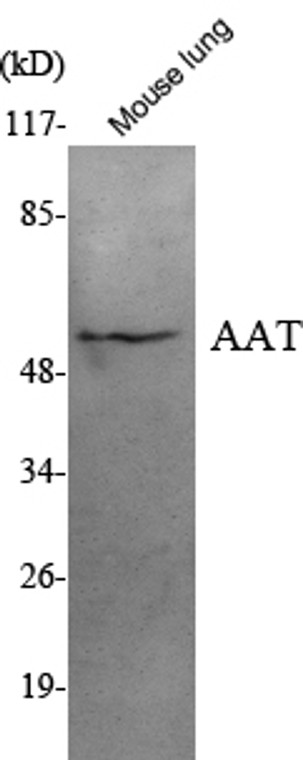| Host: |
Mouse |
| Applications: |
WB |
| Reactivity: |
Human |
| Note: |
STRICTLY FOR FURTHER SCIENTIFIC RESEARCH USE ONLY (RUO). MUST NOT TO BE USED IN DIAGNOSTIC OR THERAPEUTIC APPLICATIONS. |
| Short Description: |
Mouse monoclonal antibody anti-Alpha-1-antitrypsin (C-Term) is suitable for use in Western Blot research applications. |
| Clonality: |
Monoclonal |
| Conjugation: |
Unconjugated |
| Formulation: |
Liquid in 0.1M Tris-Glycine (pH7.4, 150 mM NaCl) , 0.2% Sodium Azide and 50% Glycerol. |
| Purification: |
Affinity purification |
| Concentration: |
1 mg/mL |
| Dilution Range: |
WB 1:1000-1:2000 |
| Storage Instruction: |
Store at-20°C for up to 1 year from the date of receipt, and avoid repeat freeze-thaw cycles. |
| Gene Symbol: |
SERPINA1 |
| Gene ID: |
5265 |
| Uniprot ID: |
A1AT_HUMAN |
| Immunogen Region: |
C-Term |
| Specificity: |
AAT Monoclonal Antibody detects endogenous levels of AAT protein. |
| Immunogen: |
Purified recombinant human the amino acidT (C-terminus) protein fragments expressed in E.coli. |
| Post Translational Modifications | N-glycosylated. Differential glycosylation produces a number of isoforms. N-linked glycan at Asn-107 is alternatively di-antennary, tri-antennary or tetra-antennary. The glycan at Asn-70 is di-antennary with trace amounts of tri-antennary. Glycan at Asn-271 is exclusively di-antennary. Structure of glycans at Asn-70 and Asn-271 is Hex5HexNAc4. The structure of the antennae is Neu5Ac(alpha1-6)Gal(beta1-4)GlcNAc attached to the core structure Man(alpha1-6)Man(alpha1-3)Man(beta1-4)GlcNAc(beta1-4)GlcNAc. Some antennae are fucosylated, which forms a Lewis-X determinant. Proteolytic processing may yield the truncated form that ranges from Asp-30 to Lys-418. (Microbial infection) Proteolytically processed by Staphylococcus aureus seryl, cysteinyl, and metallo-proteases. |
| Function | Inhibitor of serine proteases. Its primary target is elastase, but it also has a moderate affinity for plasmin and thrombin. Irreversibly inhibits trypsin, chymotrypsin and plasminogen activator. The aberrant form inhibits insulin-induced NO synthesis in platelets, decreases coagulation time and has proteolytic activity against insulin and plasmin. Short peptide from AAT: Reversible chymotrypsin inhibitor. It also inhibits elastase, but not trypsin. Its major physiological function is the protection of the lower respiratory tract against proteolytic destruction by human leukocyte elastase (HLE). |
| Protein Name | Alpha-1-AntitrypsinAlpha-1 Protease InhibitorAlpha-1-AntiproteinaseSerpin A1 Cleaved Into - Short Peptide From AatSpaat |
| Database Links | Reactome: R-HSA-114608Reactome: R-HSA-204005Reactome: R-HSA-381426Reactome: R-HSA-5694530Reactome: R-HSA-6798695Reactome: R-HSA-8957275 |
| Cellular Localisation | SecretedEndoplasmic ReticulumThe S And Z Allele Are Not Secreted Effectively And Accumulate Intracellularly In The Endoplasmic ReticulumShort Peptide From Aat: SecretedExtracellular SpaceExtracellular Matrix |
| Alternative Antibody Names | Anti-Alpha-1-Antitrypsin antibodyAnti-Alpha-1 Protease Inhibitor antibodyAnti-Alpha-1-Antiproteinase antibodyAnti-Serpin A1 Cleaved Into - Short Peptide From Aat antibodyAnti-Spaat antibodyAnti-SERPINA1 antibodyAnti-AAT antibodyAnti-PI antibodyAnti-PRO0684 antibodyAnti-PRO2209 antibody |
Information sourced from Uniprot.org
12 months for antibodies. 6 months for ELISA Kits. Please see website T&Cs for further guidance






